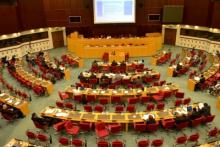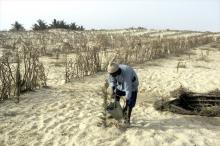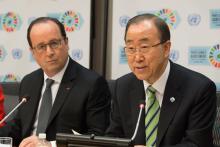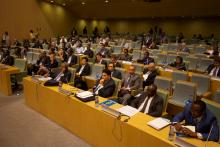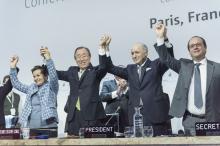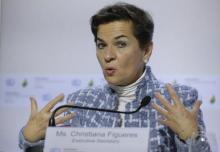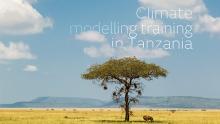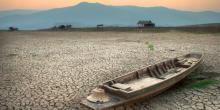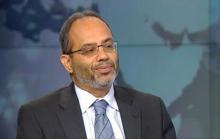ADDIS ABABA, Ethiopia (PAMACC News) - The Sixth Conference on Climate Change and Development in Africa (CCDA–VI) has kicked off in Addis Ababa Ethiopia, with climate experts, government representatives and civil society organisations examining how implementation of the Paris Agreement will impact the continent.
In The News
|
|
|
5 April 2016. African countries can position themselves to be "front runners" in the goal to achieve a more sustainable future. That's the opinion of Fatima Denton, an energy expert who heads the Special Initiatives Division at the African Climate Policy Centre. The Centre is based at the UN Economic Commission for Africa in Addis Ababa, Ethiopia, which has just wrapped up African Development Week. Ernest Chi Cho caught up with Ms Denton to find out what implications the recently adopted Paris Agreement on climate change will have for the continent. |
|
22 April 2016 – As 175 world leaders signed the Paris Agreement at United Nations Headquarters today, Secretary-General Ban Ki-moon said the next critical step is to ensure that the landmark accord for global action on climate change enters into force as soon as possible. “Today is an historic day,” Mr. Ban told reporters at a press conference following the opening ceremony of the signing event. “This is by far the largest number of countries ever to sign an international agreement on a single day.” |
|
Each year, the Africa Climate Resilient Infrastructure Summit (ACRIS II) brings Government, Worldwide Agency (UN, U.S. EU etc.), NGO and Chamber stakeholders together with leading local, regional and global operators for high-level sessions to develop Africa's Climate Resilient Infrastructure through public-private partnerships (PPPs). But for 2016, at the Hilton Addis Ababa in Ethiopia, GRV Global were thrilled to welcome an additional delegation of some 60+ ministerial-level decision makers from across Africa for Special Sessions organised by The World Bank, African Union Commission (AUC) and the UN Economic Commission for Africa (UNECA). |
|
On 12 December 2015, countries under the UN Framework Convention on Climate Change (UNFCCC) adopted the Paris Agreement. The legal nature of this new, international agreement requires actions and steps to bring it into force. How the large number of national climate plans will be handled in relation to the agreement is also explained below. In addition, the UNFCCC secretariat has prepared a legal version of these steps for readers who require the important, detailed formal wording and terminology that relates to this major international agreement. The authentic English text of the Paris Agreement is found here on the UNFCCC website. Read more |
|
LONDON (Thomson Reuters Foundation) - The next head of the U.N. process to tackle climate change should come from one of the world's poorest countries, which led an ambitious drive to limit global warming to 1.5 degrees Celsius in the new Paris deal, a leading expert has proposed. With Christiana Figueres stepping down as executive secretary of the U.N. climate change convention in July, "it's time for the least developed countries to have a chance at that particular slot", said Saleemul Huq, director of the Dhaka-based International Centre for Climate Change and Development. |
|
Thanks to Met Office training and technology, experts in Tanzania and Malawi are now able to conduct climate change projections to the year 2099.
The Met Office has had a long, strong relationship with the Tanzania Meteorological Agency (TMA). The Met Office has been involved in various capacity building projects in Tanzania, including installing a TV weather studio with funding from the Voluntary Cooperation Programme (VCP) of the World Meteorological Organization (WMO).
|
|
Of all the continents, historically Africa has contributed the least to the emissions of greenhouse gases that have caused today’s climate change catastrophe. Yet, it will be most severely impacted. Climate finance is therefore a highly contentious issue for Africa and represents a moral and survival issue in the context of the United Nations Framework Convention on Climate Change (UNFCCC) negotiations. Read more ... |
|
From the opening of the 2015 United Nations Climate Change Conference (COP21), African leaders have made strong stands for their continent’s need for energy expansion, and the minimisation of the detrimental effects of climate change. Matching responses were received from the international community in the form of substantial commitments made to a renewable energy initiative and adaptation fund. |
|
© Autre presse par DR |
